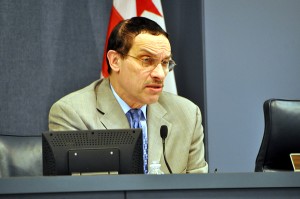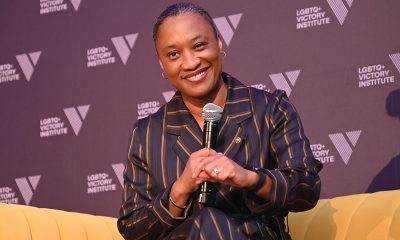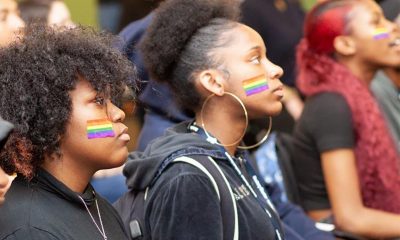Local
LGBT witnesses back D.C. anti-bullying bills
ACLU says legislation could violate students’ civil liberties


D.C. Mayor-elect Vincent Gray presided over a hearing this week on two bills to address bullying and harassment in public schools. (Washington Blade file photo by Michael Key)
Nine witnesses representing the LGBT community expressed strong support for two bills aimed at prohibiting bullying in D.C. schools, public libraries and parks during a City Council hearing this week.
The LGBT witnesses, including two gay and one transgender student, gave examples of anti-LGBT bullying and harassment in the D.C. public school system. They joined other witnesses in noting that existing public school policies pertaining to bullying were not strong enough to adequately address the problem.
“The District of Columbia has been a pioneer on issues such as nondiscrimination in schools and yet is one of only a handful of jurisdictions in this country without an anti-bullying law,” said Alison Gill, a public policy associate with the Gay, Lesbian & Straight Education Network (GLSEN).
Gill and other witnesses pointed to the 2009 D.C. Youth Risk Behavior Survey, a federally funded study that includes data on lesbian, gay, and bisexual youth. Among other things, the study found that 29 percent of LGB teens in the city’s middle schools and high schools have attempted suicide. The study did not collect data on transgender students.
Anti-gay bullying and harassment are believed to have played a large role in prompting the youth to consider suicide, Gill and other witnesses said.
D.C. Mayor-elect Vincent Gray presided over the hearing in his current role as City Council Chair and chair of the Council’s Committee of the Whole. He takes office as mayor on Jan. 2.
The Committee of the Whole and the Committee on Libraries, Parks and Recreation, which is chaired by Council member Harry Thomas (D-Ward 5), conducted a joint hearing on the two bills, the Bullying Prevention Act of 2010 and the Harassment and Intimidation Prevention Act of 2010.
Gray said after the hearing that the two bills would be combined following a markup hearing that he predicted would take place sometime next year.
“I don’t see the evidence of a comprehensive policy existing in the city on this,” Gray told reporters after the hearing, saying a combined version of the two bills would go a long way to address the problem of bullying.
The Bullying Prevention Act, which Gray and Council member Michael Brown (I-At-Large) introduced in April, calls for developing a “model policy prohibiting bullying, harassment and intimidation in the District of Columbia public schools.” It requires all public schools to adopt an anti-bullying and harassment policy at least as strong as the model policy defined in the bill.
The Harassment and Intimidation Prevention Act, which was introduced in October by Thomas, calls for developing similar policies banning bullying and harassment but expands the coverage to D.C. public charter schools, the city’s public libraries and parks and recreation centers, and to the University of the District of Columbia.
Thomas’s bill also covers bullying and harassment conducted through “electronic communication,” such as e-mail or social networking sites.
The bill defines harassment, intimidation or bullying as “any gesture or written, verbal or physical act, including electronic communication, that is reasonably perceived as being motivated either by any actual or perceived characteristic, such as race, color, religion, ancestry, national origin, gender, sexual orientation, gender identity and expression, or a mental, physical or sensory handicap, or by any other distinguishing characteristic…”
It says an act of bullying, intimidation or harassment would be one that “a reasonable person should know, under the circumstances, will have the effect of harming a student or damaging the student’s property, or placing a student in reasonable fear of harm to his person or damage to his property.”
The definition further states that the act in question “has the effect of insulting or demeaning any student or group of students in such as way as to cause substantial disruption in, or substantial interference with, the orderly operation of a school, university, recreation facility, or library.”
Arthur Spitzer, legal director of the D.C. chapter of the ACLU, said the ACLU supports the concept of anti-bullying legislation but has concerns that the wording of the two proposed bills in D.C. could violate students’ civil liberties.
“What does it mean by harming a student?” he said of part of the definition in one of the bills. “Does that mean hurting a student’s feelings? If a student comes in and says I feel very harmed by the fact that so and so said I was a crappy athlete … That’s not bullying,” he said.
“So I think the language here needs to be tightened up.”
Spitzer told the Washington Post that it would be “perfectly legitimate” for a student to say he or she thinks homosexual conduct is “against the word of God.” Although such a comment might hurt the feelings of a gay student, that should not be defined as bullying but instead as “an opinion that every student has a right to express,” he told the Post.
GLSEN spokesperson Daryl Presgraves said GLSEN believes the language in the two D.C. bills would not violate students’ civil liberties. But he said GLSEN and others supporting the bills would be open to making changes if the ACLU demonstrates that the language would prevent students from expressing their opinions in a way that doesn’t cross the line of true bullying and harassment.
Trina Cole, a male to female transgender student who graduated in 2009 from D.C.’s Dunbar Senior High School, told the hearing she was victimized by harassment and intimidation that went far beyond hurting her feelings.
“At school, I was often both verbally and physically abused,” she said. “We need to have more support in our schools so that the bullying that I went through does not continue to happen every day.”
Cole testified on behalf of Metro Teen AIDS, a D.C.-based group that provides services to LGBT youth at risk for HIV.
Ginnie Cooper, chief librarian for the city’s public library system; Jesus Auguirre, director of the Department of Parks and Recreation; and Mark Farley, vice president of the Office of Human Resources for the University of the District of Columbia each expressed strong support for the two bills.
A spokesperson for the D.C. public schools did not appear before the hearing. Gray said the person expected to testify had a scheduling conflict and was expected to submit written testimony within the next week.
Gay activist and ANC commissioner-elect Bob Summersgill noted that the D.C. Public Schools currently use city-adopted regulations pertaining to student discipline as a basis for addressing bullying and harassment of students. A provision of the city’s Human Rights Act and a March 2000 directive by the then D.C. schools superintendent are also used as a patchwork of rules or laws to address bullying.
“The limitations in all of these laws and regulations are the implementation and enforcement,” Summersgill told the hearing. “If a school fails to make clear that bullying will not be tolerated, or if a teacher or staff fails to intervene when bullying occurs, or if a teacher or staff makes a derogatory comment or through inaction shows their distaste for some group, then they are tacitly giving approval of bullying and harassment,” he said.
Michael Musante, an official with Friends of Choice in Urban Schools (FOCUS), which advocates for D.C.’s public charter schools, said the group did not support the proposed legislation, saying charter schools were formed as semi-autonomous institutions independent from city control.
He said many charter schools already have anti-bullying polices and said charter schools prefer to address bullying through school disciplinary codes rather than “one-size-fits-all legislation.”
Gray and Council member Michael Brown, speaking after the hearing, said they favor including charter schools in the legislation before the Council.
“They have over 30,000 of our kids being educated with public money,” Gray said of the charter schools.
Others who testified in favor of the bills at the hearing included Renee Reopell, program associate for the D.C. LGBT community center; Peter Rosenstein, LGBT community activist; Rick Rosendall, vice president of the Gay & Lesbian Activists Alliance; Bill Briggs, executive director of Metro D.C. Parents, Families and Friends of Lesbians and Gays (PFLAG); and Andrew Barnett, executive director of Sexual Minority Youth Assistance League (SMYAL).
Maryland
Rockville teen charged with plotting school shooting after FBI finds ‘manifesto’
Alex Ye charged with threats of mass violence

BY BRETT BARROUQUERE | A Montgomery County high school student is charged with what police describe as plans to commit a school shooting.
Andrea Ye, 18, of Rockville, whose preferred name is Alex Ye, is charged with threats of mass violence. Montgomery County Police and the FBI arrested Ye Wednesday.
The rest of this article can be found on the Baltimore Banner’s website.
District of Columbia
New D.C. LGBTQ+ bar Crush set to open April 19
An ‘all-inclusive entertainment haven,’ with dance floor, roof deck

D.C.’s newest LGBTQ+ bar called Crush is scheduled to open for business at 4 p.m. on Friday, April 19, in a spacious, two-story building with a dance floor and roof deck at 2007 14th St., N.W. in one of the city’s bustling nightlife areas.
A statement released by co-owners Stephen Rutgers and Mark Rutstein earlier this year says the new bar will provide an atmosphere that blends “nostalgia with contemporary nightlife” in a building that was home to a popular music store and radio supply shop.
Rutgers said the opening comes one day after Crush received final approval of its liquor license that was transferred from the Owl Room, a bar that operated in the same building before closing Dec. 31 of last year. The official opening also comes three days after Crush hosted a pre-opening reception for family, friends, and community members on Tuesday, April 16.
Among those attending, Rutgers said, were officials with several prominent local LGBTQ organizations, including officials with the DC Center for the LGBTQ Community, which is located across the street from Crush in the city’s Reeves Center municipal building. Also attending were Japer Bowles, director of the Mayor’s Office of LGBTQ Affairs, and Salah Czapary, director of the Mayor’s Office of Nightlife and Culture.
Rutgers said Crush plans to hold a grand opening event in a few weeks after he, Rutstein and the bar’s employees become settled into their newly opened operations.
“Step into a venue where inclusivity isn’t just a promise but a vibrant reality,” a statement posted on the Crush website says. “Imagine an all-inclusive entertainment haven where diversity isn’t just celebrated, it’s embraced as the very heartbeat of our venue,” the statement says. “Welcome to a place where love knows no bounds, and the only color or preference that matters is the vibrant tapestry of humanity itself. Welcome to Crush.”
The website says Crush will be open Tuesdays and Wednesdays from 4 p.m. to 12 a.m., Thursdays from 4 p.m. to 2 a.m., Fridays from 4 p.m. to 3 a.m., Saturdays from 2 p.m. to 3 a.m., and Sundays from 2 p.m. to 12 a.m. It will be closed on Mondays.
Crush is located less than two blocks from the U Street Metro station.
District of Columbia
Reenactment of first gay rights picket at White House draws interest of tourists
LGBTQ activists carry signs from historic 1965 protest

About 30 LGBTQ activists formed a circular picket line in front of the White House Wednesday afternoon, April 17, carrying signs calling for an end to discrimination against “homosexuals” in a reenactment of the first gay rights protest at the White House that took place 59 years earlier on April 17, 1965.
Crowds of tourists looked on with interest as the activists walked back and forth in silence in front of the White House fence on Pennsylvania Avenue. Like the 1965 event, several of the men were dressed in suits and ties and the women in dresses in keeping with a 1960s era dress code policy for protests of the Mattachine Society of Washington, D.C., the city’s first gay rights group that organized the 1965 event.
Wednesday’s reenactment was organized by D.C.’s Rainbow History Project, which made it clear that the event was not intended as a protest against President Joe Biden and his administration, which the group praised as a strong supporter of LGBTQ rights.
“I think this was an amazing event,” said Vincent Slatt, the Rainbow History Project official who led efforts to put on the event. “We had twice as many that we had hoped for that came today,” he said.
“It was so great to see a reenactment and so great to see how far we’ve come,” Slatt said. “And also, the acknowledgement of what else we still need to do.”
Slatt said participants in the event who were not carrying picket signs handed out literature explaining the purpose of the event.
A flier handed out by participants noted that among the demands of the protesters at the 1965 event were to end the ban on homosexuals from working in the federal government, an end to the ban on gays serving in the military, an end to the denial of security clearances for gays, and an end of the government’s refusal to meet with the LGBTQ community.
“The other thing that I think is really, really moving is some of the gay staff inside the White House found out this was happening and came out to greet us,” Slatt said. He noted that this highlighted how much has changed since 1965, when then President Lyndon Johnson’s White House refused to respond to a letter sent to Johnson from the Mattachine Society explaining its grievances.
“So now to have gay people in the White House coming out to give us their respects and to say hello was especially meaningful to us,” Slatt said. “That was not expected today.”
Among those walking the picket line was longtime D.C. LGBTQ rights advocate Paul Kuntzler, who is the only known surviving person who was among the White House picketers at the April 1965 event. Kuntzler said he proudly carried a newly printed version of the sign at Wednesday’s reenactment event that he carried during the 1965 protest. It stated, “Fifteen Million Homosexuals Protest Federal Treatment.”
Also participating in the event was Japer Bowles, director of D.C. Mayor Muriel Bowser’s Office of LGBTQ Affairs. Bowles presented Slatt with a proclamation issued by Bowser declaring April 17, 2024, Mattachine Society Day in Washington, D.C.
“Whereas, on April 17, 1965, the Mattachine Society of Washington courageously held the nation’s inaugural picket for gay rights, a seminal moment in the ongoing struggle for LGBTQIA+ equality in the United States, marking the genesis of public demonstrations advocating for those rights and paving the way for Pride Marches and Pride celebrations worldwide,” the proclamation states.
About 30 minutes after the reenactment event began, uniformed Secret Service agents informed Slatt that due to a security issue the picketers would have to move off the sidewalk in front of the White House and resume the picketing across the street on the sidewalk in front of Lafayette Park. When asked by the Washington Blade what the security issue was about, one of the Secret Service officers said he did not have any further details other than that his superiors informed him that the White House sidewalk would have to be temporarily cleared of all people.
Participants in the event quickly resumed their picket line on the sidewalk in front of Lafayette Park for another 30 minutes or so in keeping with the 1965 picketing event, which lasted for one hour, from 4:20 p.m. to 5:20 p.m., according to Rainbow History Project’s research into the 1965 event.
Although the LGBTQ picketers continued their procession in silence, a separate protest in Lafayette Park a short distance from the LGBTQ picketers included speakers shouting through amplified speakers. The protest was against the government of Saudi Arabia and organized by a Muslim group called Al Baqee Organization.
A statement released by the Rainbow History Project says the reenactment event, among other things, was a tribute to D.C.-area lesbian rights advocate Lilli Vincenz, who participated in the 1965 White House picketing, and D.C. gay rights pioneer Frank Kameny, who founded the Mattachine Society of Washington in the early 1960s and was the lead organizer of the 1965 White House protest. Kameny died in 2011 and Vincenz died in 2023.
The picket signs carried by participants in the reenactment event, which were reproduced from the 1965 event, had these messages:
• “DISCRIMINATION Against Homosexuals is as immoral as Discrimination Against Negroes and Jews;”
• “Government Should Combat Prejudice NOT PROMOTE IT”
• “White House Refuses Replies to Our Letters, AFRAID OF US?
• “HOMOSEXUALS Died for their Country, Too”
• “First Class Citizenship for HOMOSEXUALS”
• “Sexual Preference is Irrelevant to Employment”
• “Fifteen Million U.S. Homosexuals Protest Federal Treatment”
-

 Africa4 days ago
Africa4 days agoCongolese lawmaker introduces anti-homosexuality bill
-

 District of Columbia1 day ago
District of Columbia1 day agoReenactment of first gay rights picket at White House draws interest of tourists
-

 World4 days ago
World4 days agoOut in the World: LGBTQ news from Europe and Asia
-

 Arizona1 day ago
Arizona1 day agoAriz. governor vetoes anti-transgender, Ten Commandments bill












